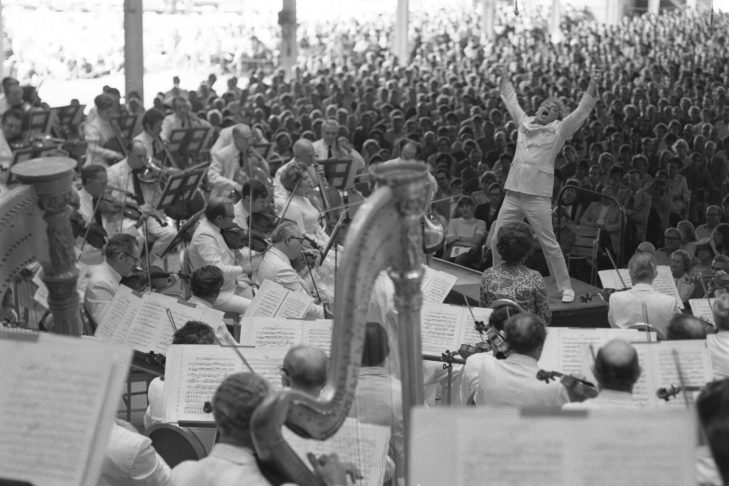Cue up Leonard Bernstein.
When Andris Nelsons raises his baton on the stage of Symphony Hall on Friday evening, Sept. 22, he’ll be ushering in the Boston Symphony Orchestra’s 2017-18 season with a yearlong celebration of the centennial of Bernstein’s birth. It’s a noteworthy milestone of the beloved, larger-than-life conductor, pianist, prolific composer, Broadway luminary and passionate educator hailed as among the first American-born conductors—and the first Jewish-American conductor—to make his mark on the world’s stage at a time when European conductors were dominant.
In a career spanning more than half a century, Lenny, as he was fondly known, became the pride of American Jews, who kvelled over his meteoric rise as their American Jewish musical son, whose body of work ranged from the hugely popular “West Side Story” and “Candide” to scores of other Broadway collaborations and symphonic and vocal works.
The BSO’s opening night all-Bernstein program will be led by Nelsons, the BSO’s artistic director, and hosted by Frederica von Stade; the audio will be broadcast live on 99.5 WCRB. In March, the BSO will perform Bernstein’s Symphony No. 3, the “Kaddish” symphony, with conductor Giancarlo Guerrero, and his Symphony No. 2—“The Age of Anxiety”—conducted by Nelsons. Panel discussions, films, an archival exhibit and a chamber concert in Lawrence round off the celebration.
The BSO season opener is part of the kick-off of “Leonard Bernstein at 100,” a two-year global bonanza of all things Bernstein that includes concerts and exhibits, including one beginning in March at the National Museum of American Jewish History in Philadelphia.
Other local highlights include a performance of “Trouble in Tahiti,” by Boston Lyric Opera, that had its world premiere in 1952 at Brandeis University. Brandeis will honor the legendary composer with its own series of programs that will highlight Bernstein’s longtime ties with the college, where he taught for several years. He also launched its Creative Arts Festival, now named in his memory, according to Ingrid Schorr, director of the school’s Office of the Arts.
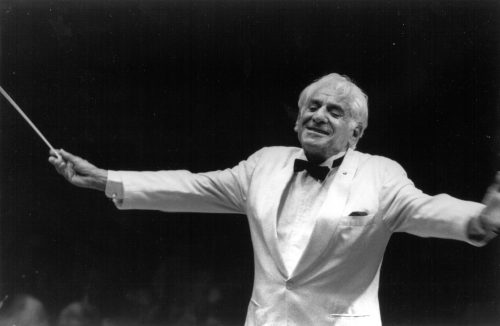
Bernstein’s Jewish Boston roots
Born in Lawrence on Aug. 25, 1918, Bernstein was the oldest child of Samuel and Jenny Bernstein, Jewish immigrants from the Ukraine.
As a teen, Bernstein thrived at Boston Latin School, according to his son, Alexander Bernstein. “It gave him a sense of possibility” in the broader, secular world, he told JewishBoston in a phone conversation, noting that there were not many Jewish students there at the time.
Despite strong disapproval from his father, Bernstein pursued his musical interests, graduating from Harvard University and then studying at the Curtis Institute of Music in Philadelphia.
In 1940, the young Bernstein was in the first class of the BSO’s summer educational institute at Tanglewood, where he came under the tutelage and influence of Serge Koussevitzky, later becoming his conducting assistant. He rose to public acclaim at age 26, when he stepped in on only a few hours’ notice to conduct the New York Philharmonic, and for the next 50-plus years until his death in 1990, the maestro captivated audiences of all ages with flourish and charm.
“Bernstein is evergreen,” according to Kay Kaufman Shelemay, a professor of music at Harvard, who in 2005 co-taught a yearlong course with Carol Oja, now chair of Harvard’s music department, that explored Bernstein’s lesser-known Boston roots.
His music crossed so many boundaries, from art songs to musicals to liturgical compositions, Shelemay said in a phone conversation. The Harvard course also delved into the influence of the music he heard at Congregation Mishkan Tefila, his family’s synagogue, where Solomon Braslavsky, the Russian-born, European-trained conductor, served as the synagogue’s innovative and influential vocal director and organist during Bernstein’s youth.
Among the archives at Mishkan Tefila is a 1973 letter Bernstein wrote to the synagogue: “I…never forget the tremendous influence your congregation made on me when I was a youngster.”
He and his wife, Felicia Cohn Montealegre, were married there in 1951, and, in 1968, three generations of Bernsteins celebrated Alexander’s bar mitzvah there. In addition to Alex, the Bernsteins had two daughters, Jamie and Nina.
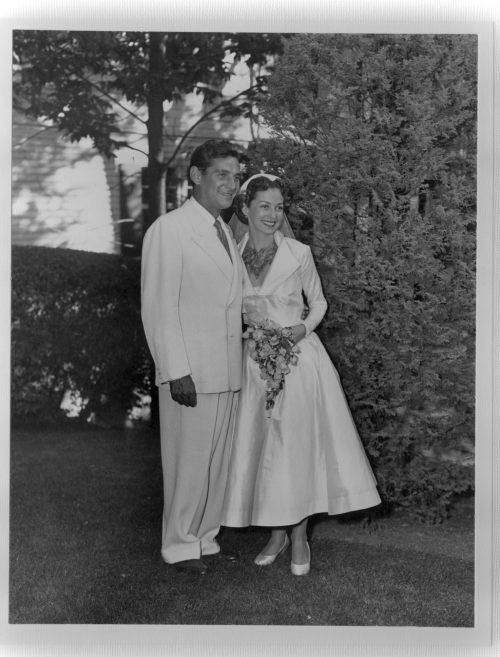
A love letter to Boston and a love of Israel
For its Bernstein centennial program, the BSO has chosen major orchestral works that highlight Bernstein’s shared history with the orchestra and Symphony Hall, according to Eric Valliere, the BSO’s assistant artistic administrator.
“Kaddish,” his third symphony (playing March 15-17), a BSO commission for its 75th anniversary, had its American premiere at Symphony Hall in 1964; Symphony No. 2, “The Age of Anxiety” (playing March 22-24), had its 1949 world premiere at Symphony Hall.
Boston audiences will be treated to Bernstein’s music that others won’t get, Valliere said. On Friday evening, audience members will hear Bernstein’s “Symphonic Dances” from “West Side Story,” and vocal selections performed by von Stade and soprano Julia Bullock, as well as “Divertimento,” a delightful and charming piece commissioned by the BSO for the orchestra’s own centennial, Valliere added.
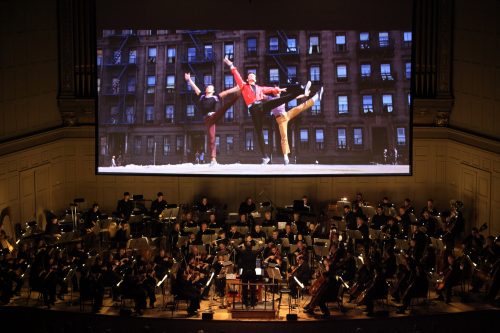
“It’s a love letter to Boston” based on two notes, B and C, that stand for Boston and centennial, Valliere said.
“Halil,” a somber-toned work for flute, strings and percussion, will also be performed on Friday, with BSO principal flute Elizabeth Rowe. Bernstein wrote “Halil,” the word for flute in Hebrew, in memory of Yadin Tanenbaum, a young Israeli flute player who was killed at the Suez Canal during Israel’s 1973 Yom Kippur War.
Following its world premiere in Tel Aviv in May 1981 with the Israel Philharmonic Orchestra, Bernstein conducted its U.S. premiere on July 4 at Tanglewood.
“I never knew Yadin Tanenbaum, but I know his spirit,” Bernstein wrote at the time, dedicating the piece to “the spirit of Yadin and his fallen brothers.”
While not familiar with “Halil,” Jonathan Sarna, the preeminent Brandeis University scholar of American Jewish history who has researched and written about Bernstein’s early life in Boston, is not surprised that the maestro felt moved to write the work for the Israeli musician killed in combat.
“Bernstein had a great love for Israel,” Sarna told JewishBoston. Bernstein was exposed to Zionism from an early age, Sarna explained. His father, a scholar of the Talmud, was deeply interested in Zionism—reflecting Boston’s strong Zionist leanings.
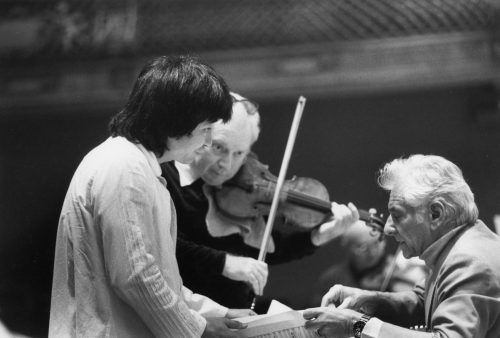
and Leonard Bernstein confer during a rehearsal at Boston’s Symphony
Hall around 1980 (Florence Y. Montgomery/Courtesy BSO Archives)
Alexander Bernstein said he and his sisters, Jamie Bernstein and Nina Bernstein Simmons, hope the centennial becomes another opportunity for younger generations to learn about his father’s work as an educator and humanitarian. He was a Renaissance man, a notion that is often overlooked as his father is most often recalled as a gifted musician with such a wide breadth of music making.
The excitement of the centennial is palpable, Bernstein enthused. “There are new events coming up every day. New works written in his honor. New ballets,” Bernstein said. “It’s fantastic.”
For full BSO programming information and tickets, visit bso.org.
This post has been contributed by a third party. The opinions, facts and any media content are presented solely by the author, and JewishBoston assumes no responsibility for them. Want to add your voice to the conversation? Publish your own post here. MORE


